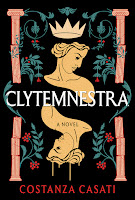Book Review: Clytemnestra by Constanza Casati

My Rating: 4.5⭐
“There will come a time when songs are sung about her, about the people she loved and the ones she hated. They will sing of her mother, the queen seduced by a god, of her brothers, boxers and horse-breakers, of her sister, a woman so vain who couldn’t stay in her husband’s bed, of Agamemnon, the proud lion of Mycenae, of the wise, many-minded Odysseus, of the treacherous, cursed Aegisthus, of Clytemnestra, cruel queen and unfaithful wife. But it doesn’t matter. She was there. She knows songs never tell the truth.”
Daughter of King Tyndareus of Sparta and his Queen Leda, the sister of Helen, and ultimately the murderous Queen of Mycenae who killed her husband Agamemnon, Clytemnestra has always been a lesser known character in comparison to her sister, and what we do know of her is in the context of her scheming and ultimately successfully executing her plan to murder her husband after he returns home after the victory at the Battle of Troy.
In her debut novel, Contanza Casati explores this character in depth. The narrative follows Clytemnestra from her early life as a Princess of Sparta, her relationship with her siblings, her subsequent marriage to her first husband and the tragic events that lead to her marriage to Agamemnon and her life as his wife and mother to his children and the events that follow. The author allows us to understand the vilified Queen and her motivations, her convictions and how the people and significant events in her life shaped her into evolving into the fierce and vengeful character she is known to be. Clytemnestra is a complex character. Raised with the training of a warrior yet having to live her life according to the whims and wishes of her tyrannical father and brutish husband, she endures and perseveres and waits for the right moment to assert herself. She endures much abuse, loss and grief including the senseless murder of her first husband and infant son. But when her daughter is sacrificed in the name of war, Clytemnestra’s rage knows no bounds and she knows what she has to do.
“Gods do not care about us. They have other concerns. That is why you should never live in the shadow of their anger. It is men you must fear. It is men who will be angry with you if you rise too high, if you are too much loved. The stronger you are, the more they will try to take you down.”
The author does a magnificent job of crafting a solid narrative around this central figure. In the course of the story, we meet several more prominent characters from the Greek myths such as Helen of Troy and Odysseus among others. Most of these characters are explored/alluded to in the context of their interactions/connection to Clytemnestra’s story, and at no point does the narrative lose focus. Clytemnestra’s anguish, her pain and her need for vengeance are palpable. The pace does falter slightly in the middle of the narrative while chronicling the years Clytemnestra waits for the Battle of Troy to end while she rules over Mycenae with a firm hand, but not so much that you lose interest in the story. I particularly liked how the author chose to end the novel keeping it open-ended yet entirely satisfying. The author provides family trees at the beginning of the novel and a glossary of terms at the end, both of which are helpful resources.
Clytemnestra by Constanza Casati is a powerful debut. Well-structured and written in elegant prose with a fluid narrative, this novel is a joy to read. With strong feminist overtones, this story is both brutal and compelling. Though the author does not resort to any form of exaggerated sentimentality, it is impossible to remain unaffected by Clytemnestra's story. I would not hesitate to recommend this novel to fans of reek mythology and feminist retellings/reimaginings. I look forward to reading more from this talented new author.
I paired my reading with the excellent audio narration by Olivia Vinall which truly enhanced my experience.
“Every day you try to forget, but at night you dream of the past. This is what dreams are for. To make us remember what we were, to tie us down to our memories, whether we like it or not.”
**Please note that there a multiple instances of violence against women.
Comments
Post a Comment